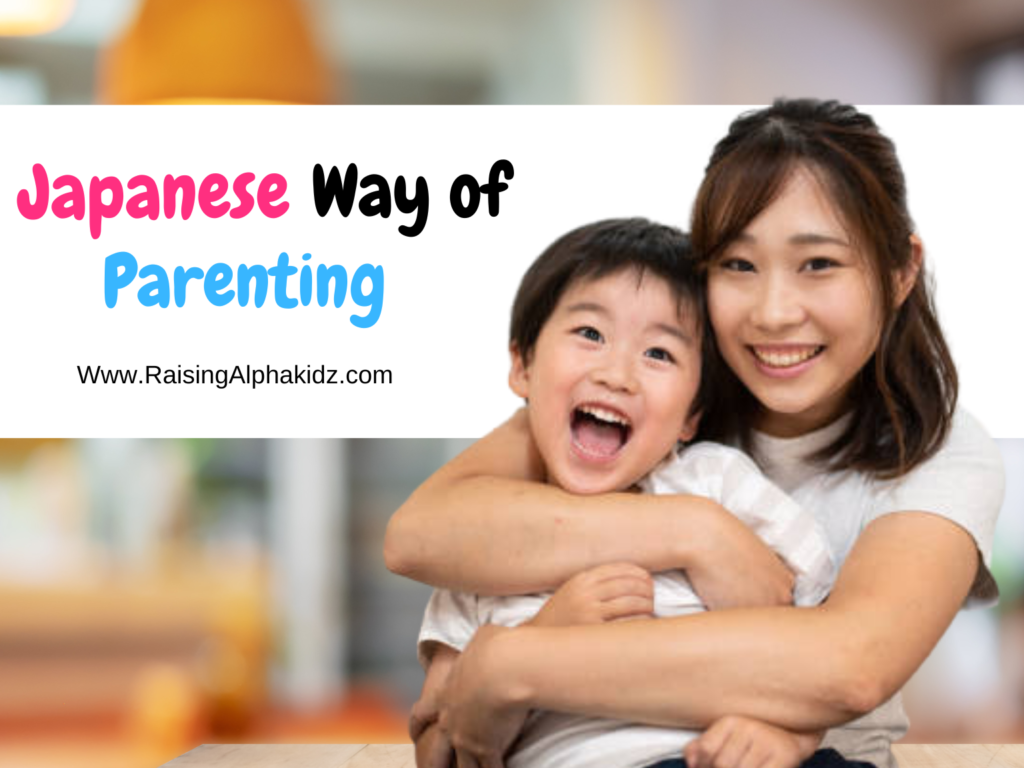As a parent, we all know Parenting is not just about providing food, shelter, and education to children, but shaping the future generation. When we talk about parenting, every culture brings its own unique wisdom to the table. But there’s something undeniably intriguing about the Japanese parenting style in raising their little ones. Let’s pull up a chair and unfold the secrets of Japanese way of parenting.
Philosophical Values: The Heart of Japanese Parenting
In general, japanese philosophy emphasis on serving community than serving the self. When comes to parenting in Japanese culture, they prioritise the same by teaching kids to serve others, live harmoniously in a community, and embodying values like honesty, self-discipline, manners & honor in first place, than teaching complex calculus or world histories. Japanese parents take out the rock-solid moral standards from culture and try instilling it into children’s modern-day lives in every aspect possible.
Mom-Centric Parenting
In Japan, the bond between mother and child is as tight as a sailor’s knot. Moms play predominant role in tending to the needs of her child, especially during the critical first two years of life. Moms in Japan are the epitome of nurturing, spending quality time with their kiddos until they turn three. It is common for Japanese mothers to prioritize caregiving responsibilities over other commitments, such as work or social activities. Even the Japanese government subsidies often provided to support this endeavor by dotting the country with breastfeeding areas and exclusive spaces for parents and kids.
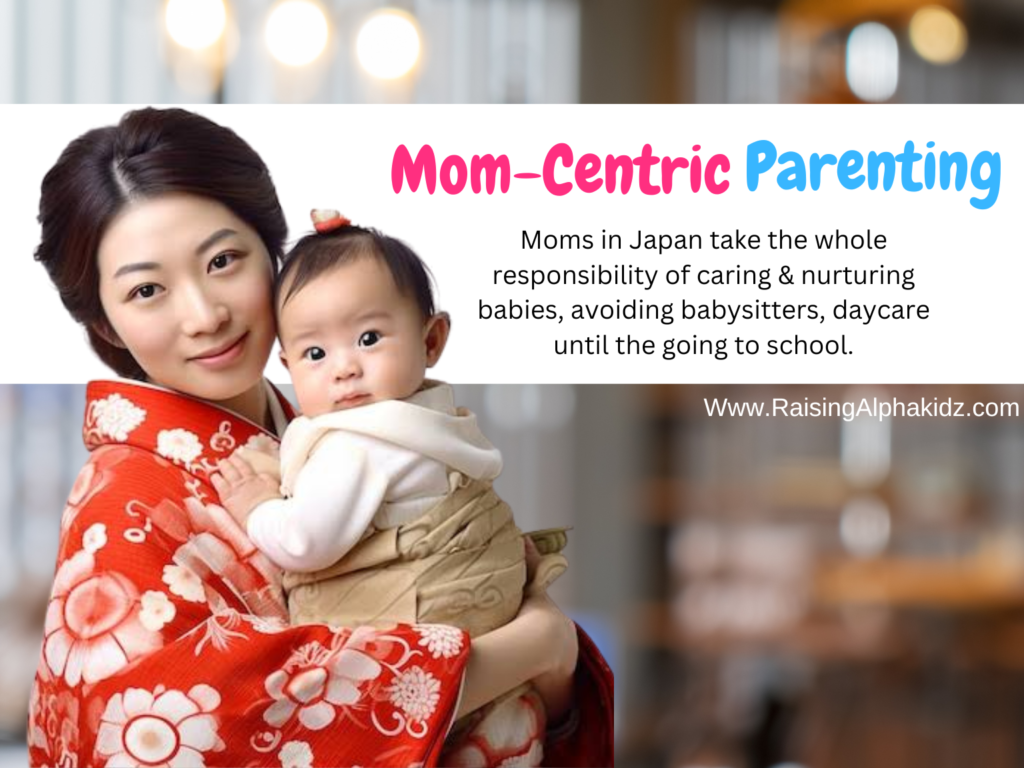
Japanese parents don’t rush their children to kindergarten before the age of three. Even appointing Babysitters or sending kids to daycare were uncommon practice in japan. Instead, they prioritize the early years as a time for nurturing and bonding with Japanese grandparents & parents
Also, it is common that Japanese mothers typically sleep alongside their children, either in the same bed or in the same room, until the children reach adolescence. It helps fostering a strong attachment between mom and child in the early years.
Teaching Independency
Once the kid grow older and begin their school years, they start emphasis on Independency in children. Children are encouraged to take ownership of personal grooming, such as doing their hair, bathing, and dressing themselves. Additionally, they are taught to independently prepare for school, including organizing their belongings and getting ready in a timely manner. Also, it is common for children to go to and walk alone from school independently. They even use public transport on their own.
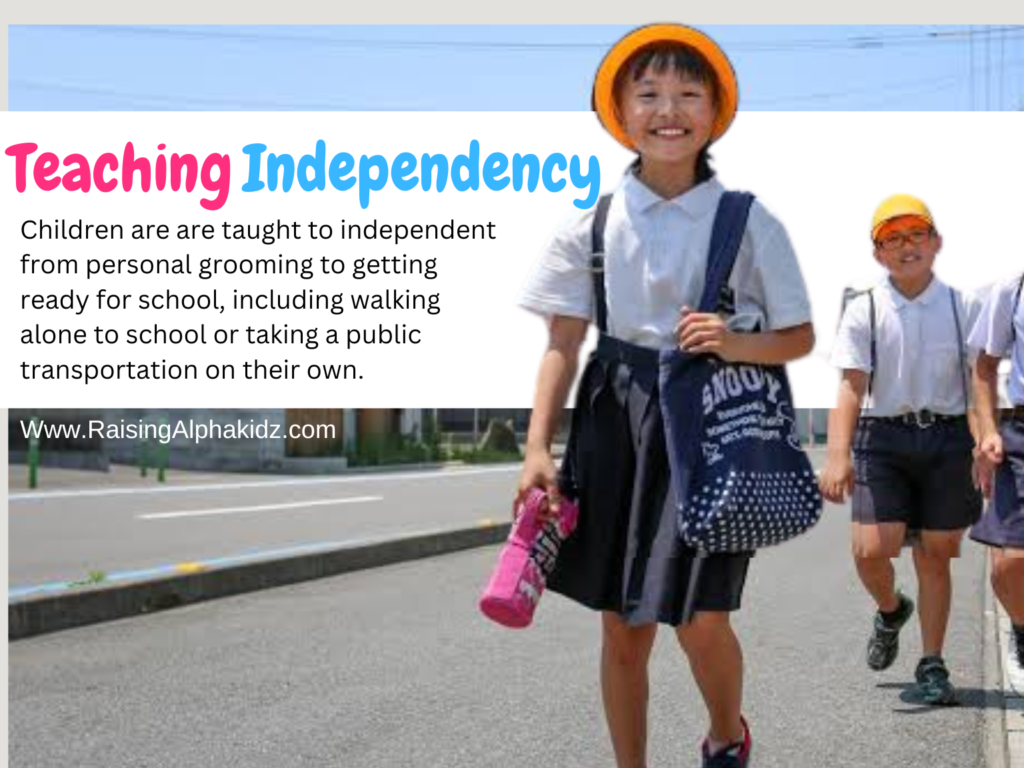
Japan’s rock-bottom crime rate make parents trust in the safety and the reliability of public services, allowing children to travel independently with confidence.
Prioritising Manners, Discipline & Self-reliance
In Japan, discipline & good manners aren’t just a nicety—they’re a way of life. From bowing to saying arigatou (thank you), kiddos are schooled in the art of politeness from a young age. During the first three years of elementary school, children focus on developing individuality and social skills, including basic lifestyle habits and manners.
Japanese parents teach their children to take up the household chores and responsibilities from young age. This approach not only prepares children for the challenges of adulthood but also fosters resilience and self-confidence from a young age.
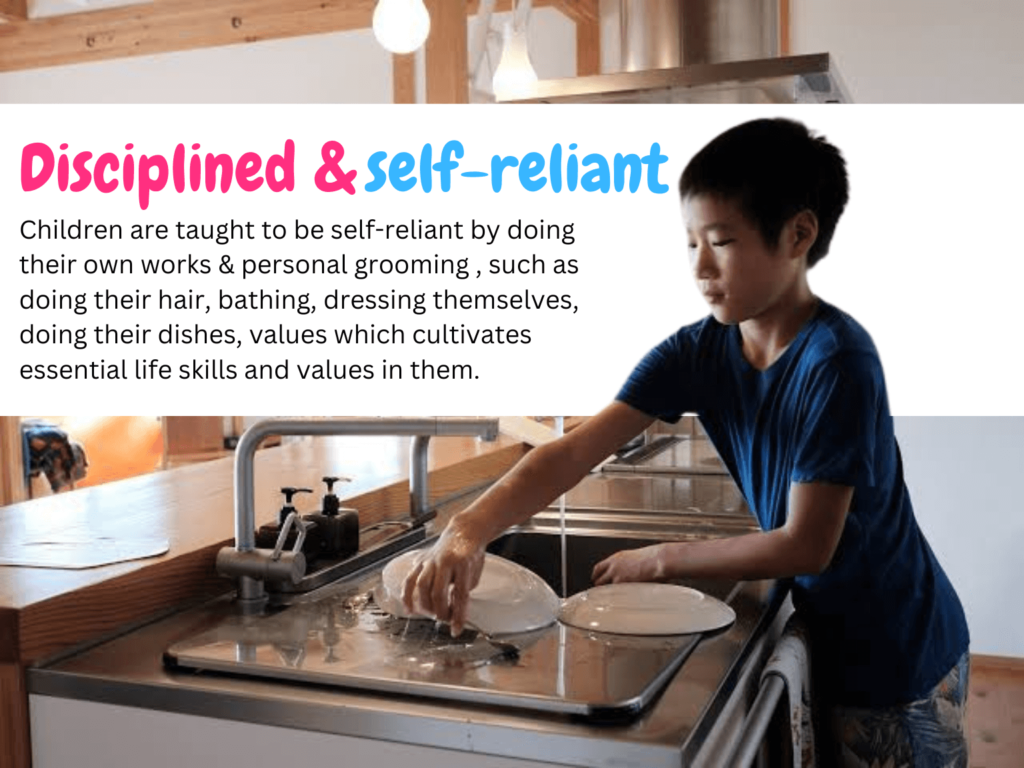
In Japan school settings, students are responsible for maintaining cleanliness and orderliness. Students used to clean their class rooms on their own and they have dedicated half an hour cleaning period after school. They make students group and alot a schedule to clean, sweep, wipe the classrooms, toilets, faculty rooms in daily or weekly shift.
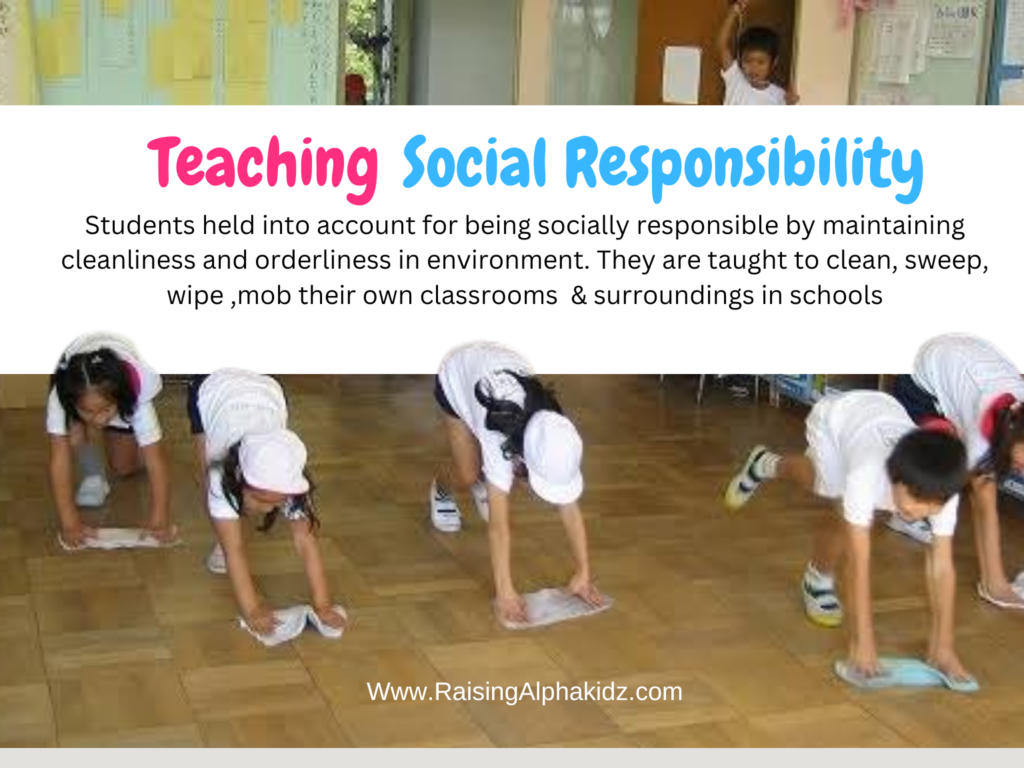
They also serve their own lunches and do their dishes. The overall expectation is for students to actively participate in maintaining a clean and orderly environment. This hands-on approach to chores instills a sense of pride and ownership in maintaining their environment and cultivating essential life skills and values.
Embracing Equality & Group Orientation
Japanese society emphasis on collectivism over individualism, and parents prioritize the well-being of the collective community over their own desires. Japanese parenting practices focus on raising children to accommodate in group and be mindful of their impact on others. This makes them to be considerate about the expectations and norms of the group and community they live in. This group-oriented thinking discourages selfish behavior and encourages children to understand that their behavior not only reflects on themselves but also on their parents and people around them.
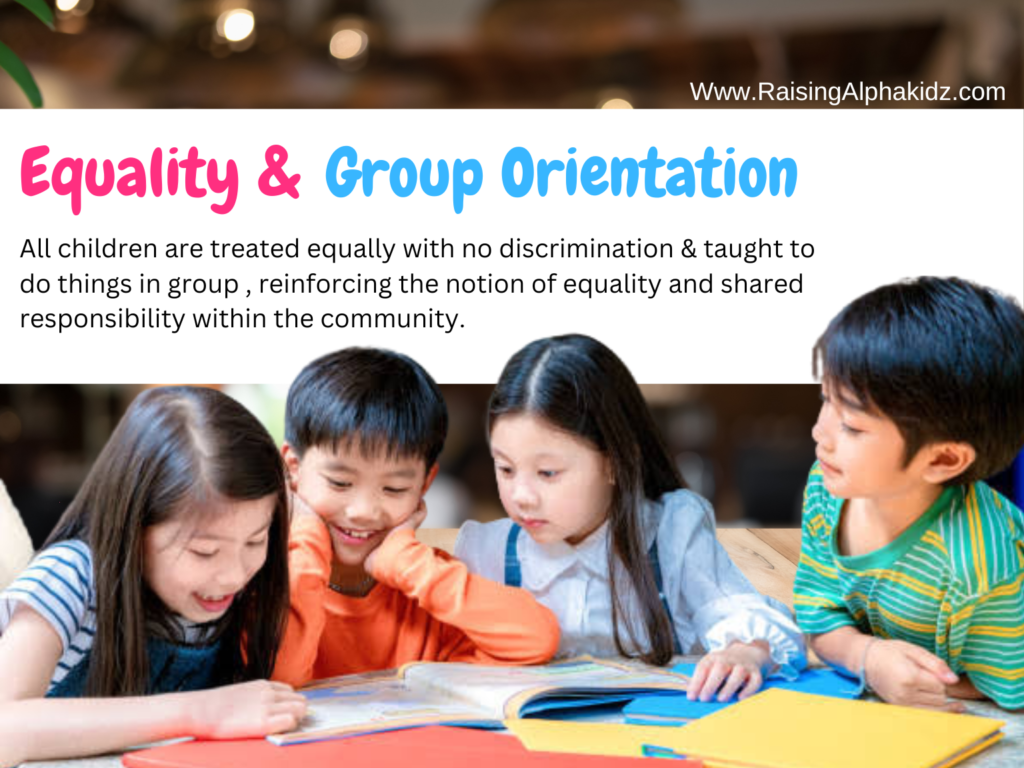
Also, they consider everyone is equal being and even royal family members never prefer enjoying the privilege over common people. Even the royal family members attend the same schools as their peers and get treated equally. This reinforces the notion of equality and shared responsibility within the community.
No Public Praise
In Japanese culture, public adoration or praise for children is not common practice. While we all love to pat on the back and praise our kid every now and then, Japanese parents take a different approach. Instead, parents encourage their children to develop self-motivation and self-discipline without relying on external validation or praising.
This approach aligns with the principles outlined in Carol Dweck’s mindset book. The book emphasizes refraining the kids from excessive praise to cultivate growth mindset. Japanese parents aim to cultivate a growth mindset in their children that values effort, growth, and resilience over taking pride in the things they are good at.
Related Post
Parenting with Emotions
In Japan, it’s not just about doing things—it’s about feeling them too. They help kids in understanding the emotions of others. They also have a habit of empathizing even with inanimate objects (yes, even toys!). This, kiddos will learn the power of connection from a tender age.
Purposeful Living: Finding Your Ikigai
Ever heard of ikigai? It’s all about finding your purpose and living a fulfilling life. And in Japan, parents go the extra mile to help their kiddos discover theirs. Whether it’s through hobbies, talents, or making a difference in the world, it’s all about finding that sweet spot where passion meets purpose.
You can know more about the ikigai way of living, by reading the Book “Ikigai, The Japanese Secret to a Long and Happy Life”.
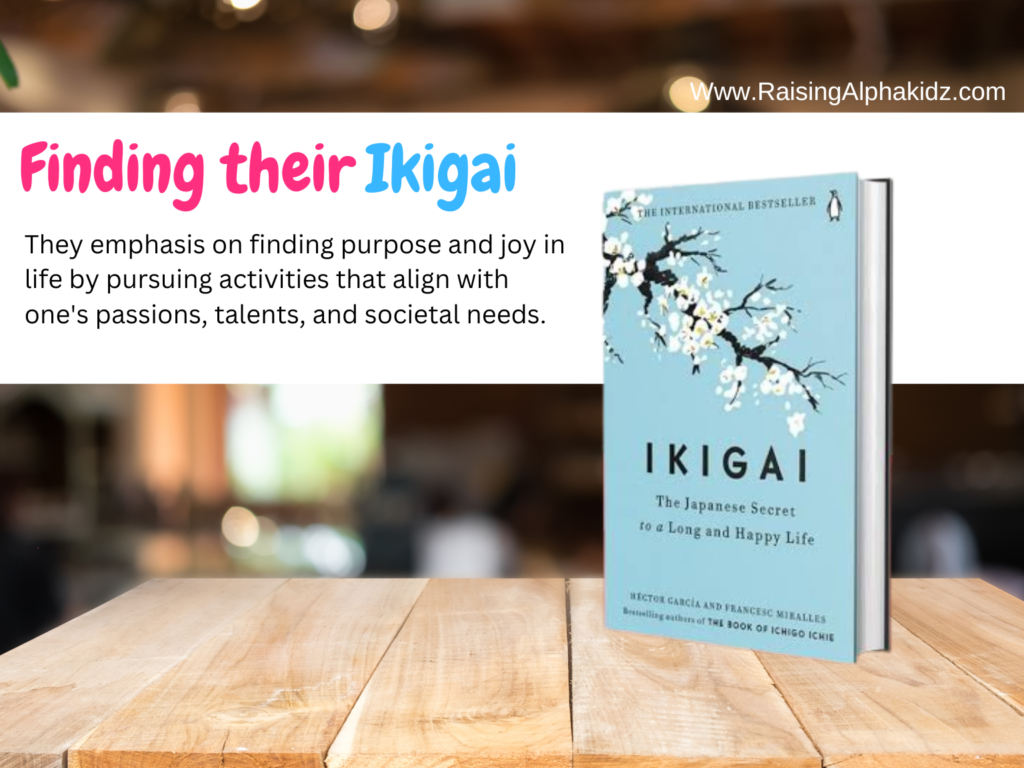
In Conclusion: The Three Stages of Japanese Parenting
So there you have it, the secret sauce behind Japanese parenting in one line. “Children are perfect before they turn 5, are like servants from age 5 to 15, and are considered equal to their parents and other people by age 15.” Westerns often interpret in wrong way, but the real philosophy behind the quote is as described below.
Stage 1: Being Attached
During the initial stage of Japanese upbringing, parents shower their children with boundless love and care. It helps fostering a strong attachment between parent and child.
Stage 2: Being Independent & Self-disciplined
In the second stage, love remains unwavering. But parents teach their children to be self-disciplined and independent adhering to societal norms and expectations.
Stage 3: Being Responsible
By the third stage, children have matured into full-fledged members of society, taking responsibility to contribute positively to their communities.
In wrapping up, exploring the Japanese way of parenting offers valuable insights into fostering discipline, respect, and independence in children. I hope this glimpse into another culture’s approach has shed some light on effective parenting strategies. Remember, parenting is as diverse as the colors of the rainbow, so take what resonates with you and adapt it to your own family’s lifestyle. Until next time, happy parenting!

